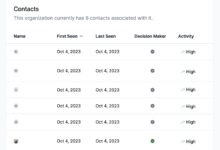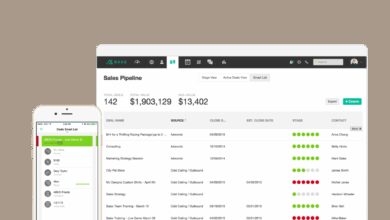CRM Base de Donnee: 7 Powerful Insights You Can’t Ignore
In today’s fast-paced digital world, a crm base de donnee is no longer a luxury—it’s a necessity. It’s the backbone of customer relationships, driving smarter decisions and boosting business growth with precision.
Understanding CRM Base de Donnee: The Core Concept

The term crm base de donnee refers to a centralized database system integrated within a Customer Relationship Management (CRM) platform. This database stores, organizes, and manages all customer-related information—ranging from contact details and purchase history to communication logs and behavioral patterns. It acts as the central nervous system of a company’s customer engagement strategy.
What Is a CRM Database?
A CRM database is a structured collection of customer data designed to support sales, marketing, and customer service operations. Unlike generic databases, a crm base de donnee is purpose-built to track interactions across multiple touchpoints, enabling businesses to maintain a 360-degree view of each customer.
- Stores personal details like names, emails, phone numbers, and addresses.
- Tracks interaction history such as emails, calls, meetings, and support tickets.
- Integrates with other business tools like email marketing platforms and ERP systems.
According to Salesforce, companies using CRM systems see a 36% increase in customer satisfaction and a 34% improvement in sales productivity.
How CRM Base de Donnee Differs from Traditional Databases
While traditional databases focus on storing raw data, a crm base de donnee emphasizes usability, accessibility, and real-time updates. It’s not just about storage—it’s about actionable intelligence.
- Dynamic updates: Data is continuously refreshed based on customer interactions.
- User-friendly interfaces: Non-technical staff can access and interpret data easily.
- Automation capabilities: Triggers workflows like follow-up emails or task assignments.
“A CRM database turns data into relationships, and relationships into revenue.” — HubSpot Insights
Why a CRM Base de Donnee Is Essential for Modern Businesses
In an era where customer experience defines competitive advantage, a crm base de donnee empowers organizations to deliver personalized, timely, and relevant interactions at scale. It bridges the gap between departments and ensures everyone works with the same accurate information.
Enhancing Customer Experience
With a unified crm base de donnee, customer service agents can instantly access a client’s full history—past purchases, complaints, preferences, and more. This allows for faster resolution times and more empathetic service.
- Reduces repetition: Customers don’t have to re-explain their issues.
- Enables proactive support: Anticipate needs based on past behavior.
- Improves personalization: Tailor responses and offers to individual profiles.
For example, Zendesk reports that businesses using CRM databases reduce response times by up to 40%, significantly improving customer satisfaction.
Driving Sales Efficiency
Sales teams benefit immensely from a well-maintained crm base de donnee. It provides visibility into lead status, deal pipelines, and customer engagement levels, allowing reps to prioritize high-value opportunities.
- Automated lead scoring identifies the most promising prospects.
- Activity tracking ensures no follow-up is missed.
- Forecasting tools use historical data to predict future sales trends.
A study by Nucleus Research found that CRM applications deliver an average return of $8.71 for every dollar spent—largely due to improved sales efficiency.
Key Features of an Effective CRM Base de Donnee
Not all CRM databases are created equal. To maximize value, your crm base de donnee should include several core features that ensure data integrity, usability, and integration.
Centralized Data Storage
One of the primary advantages of a crm base de donnee is its ability to consolidate customer information from multiple sources—email, social media, websites, call centers—into a single, unified platform.
- Eliminates data silos between departments.
- Ensures consistency across marketing, sales, and support.
- Reduces errors caused by duplicate or outdated entries.
Tools like Microsoft Dynamics 365 offer robust centralized databases that sync across global teams in real time.
Real-Time Data Synchronization
A powerful crm base de donnee updates information instantly as interactions occur. Whether a customer makes a purchase online or speaks to a support agent, the change reflects immediately across all connected devices and user accounts.
- Supports remote and hybrid workforces with up-to-date insights.
- Prevents conflicting actions (e.g., two reps contacting the same client).
- Enables timely decision-making based on current data.
Advanced Search and Filtering Capabilities
With potentially thousands of customer records, finding the right data quickly is crucial. A high-performing crm base de donnee offers intuitive search functions and customizable filters.
- Search by name, company, location, purchase history, or tags.
- Save frequent queries for recurring use.
- Use AI-powered suggestions to find related contacts or trends.
For instance, Salesforce’s Einstein Search uses machine learning to deliver relevant results even with incomplete queries.
Types of CRM Base de Donnee Systems
There are several types of crm base de donnee architectures, each suited to different business needs, sizes, and technical capabilities. Choosing the right one depends on scalability, security, and integration requirements.
On-Premise CRM Databases
These are hosted locally on a company’s own servers. While they offer maximum control over data and customization, they require significant IT resources for maintenance and updates.
- Best for large enterprises with strict data compliance needs.
- Higher upfront costs but long-term ownership.
- Vulnerable to hardware failures without proper backup systems.
Oracle CRM is a classic example of an on-premise solution used by financial institutions and government agencies.
Cloud-Based CRM Databases
Cloud-based crm base de donnee systems are hosted by third-party providers and accessed via the internet. They dominate the market due to their flexibility, affordability, and ease of deployment.
- Lower entry cost with subscription-based pricing.
- Automatic updates and built-in security patches.
- Scalable to accommodate growing businesses.
Popular platforms like Zoho CRM and HubSpot CRM offer cloud-based databases that integrate seamlessly with other SaaS tools.
Hybrid CRM Database Models
Hybrid models combine on-premise and cloud solutions, allowing businesses to keep sensitive data in-house while leveraging the cloud for customer-facing applications.
- Offers a balance between control and scalability.
- Ideal for multinational companies with regional data laws.
- Requires careful integration planning to avoid data fragmentation.
IBM’s hybrid CRM approach enables clients in regulated industries to maintain GDPR and HIPAA compliance while still benefiting from cloud agility.
How to Build and Optimize a CRM Base de Donnee
Creating a successful crm base de donnee isn’t just about choosing software—it’s about strategy, data governance, and continuous optimization. A poorly managed database can lead to inaccuracies, inefficiencies, and lost opportunities.
Data Collection Best Practices
The foundation of any crm base de donnee is high-quality input. Collecting accurate, relevant, and consent-based data is essential.
- Use opt-in forms on websites and landing pages.
- Integrate with lead generation tools like LinkedIn Sales Navigator.
- Validate email addresses and phone numbers at point of entry.
Tools like Clearbit offer real-time data enrichment to enhance lead profiles automatically.
Data Cleaning and Deduplication
Over time, databases accumulate duplicates, outdated entries, and incomplete records. Regular cleaning ensures reliability.
- Schedule monthly audits to remove redundant data.
- Use deduplication tools within CRM platforms (e.g., Salesforce Duplicate Management).
- Standardize formats for names, addresses, and job titles.
A study by Experian found that poor data quality costs businesses an average of 12% of their revenue annually—making data hygiene critical.
Integration with Other Business Systems
A crm base de donnee should not exist in isolation. It must connect with marketing automation, e-commerce, accounting, and customer service platforms.
- Use APIs to sync data between CRM and tools like Mailchimp, Shopify, or QuickBooks.
- Ensure two-way synchronization so changes in one system reflect in another.
- Leverage middleware like Zapier or Make (formerly Integromat) for complex workflows.
For example, integrating your crm base de donnee with Google Analytics allows you to track how marketing campaigns influence customer behavior and conversion rates.
Security and Compliance in CRM Base de Donnee Management
With great data comes great responsibility. A crm base de donnee contains sensitive personal and financial information, making it a prime target for cyberattacks and regulatory scrutiny.
Data Encryption and Access Control
To protect customer information, modern CRM databases employ advanced security protocols.
- Encrypt data both at rest and in transit using SSL/TLS and AES standards.
- Implement role-based access control (RBAC) to limit who can view or edit records.
- Log all user activities for audit trails and anomaly detection.
Platforms like Dynamics 365 comply with ISO 27001 and SOC 2 standards, ensuring enterprise-grade security.
GDPR and Data Privacy Regulations
If your crm base de donnee stores data from EU citizens, compliance with the General Data Protection Regulation (GDPR) is mandatory. Similar laws exist in California (CCPA), Brazil (LGPD), and other regions.
- Obtain explicit consent before collecting personal data.
- Allow customers to request data deletion or access reports.
- Appoint a Data Protection Officer (DPO) if required.
Failure to comply can result in fines up to 4% of global annual turnover or €20 million, whichever is higher.
Regular Backups and Disaster Recovery
Even the most secure systems can fail. A robust backup strategy ensures business continuity.
- Schedule automated daily backups of your crm base de donnee.
- Store copies in geographically separate locations.
- Test recovery procedures quarterly to ensure readiness.
Many cloud CRM providers include automatic backups as part of their service level agreements (SLAs).
Measuring the ROI of Your CRM Base de Donnee
Investing in a crm base de donnee should yield measurable returns. Tracking key performance indicators (KPIs) helps justify the investment and identify areas for improvement.
Sales Growth and Conversion Rates
A well-maintained crm base de donnee directly impacts revenue by improving lead conversion and shortening sales cycles.
- Monitor changes in average deal size and win rate.
- Compare sales performance before and after CRM implementation.
- Track how lead nurturing campaigns influence conversion.
According to Capterra, businesses report a 29% increase in sales after adopting a CRM system.
Customer Retention and Lifetime Value
By enabling personalized engagement, a crm base de donnee helps increase customer loyalty and reduce churn.
- Calculate Customer Lifetime Value (CLV) before and after CRM adoption.
- Measure retention rates and repeat purchase frequency.
- Use feedback loops to improve post-sale experiences.
Harvard Business Review states that increasing customer retention by just 5% can boost profits by 25% to 95%.
Operational Efficiency Gains
Automation and streamlined workflows reduce manual effort and minimize errors.
- Track time saved on data entry, reporting, and follow-ups.
- Measure reduction in duplicate tasks or miscommunications.
- Assess team productivity through CRM activity logs.
Forrester Research found that employees spend 50% less time searching for customer information when using a centralized CRM database.
Future Trends Shaping CRM Base de Donnee Evolution
The crm base de donnee is not static—it’s evolving rapidly with advancements in artificial intelligence, machine learning, and data analytics. Staying ahead of these trends ensures your business remains competitive.
AI-Powered Predictive Analytics
Next-generation CRM databases use AI to analyze historical data and predict future customer behaviors.
- Forecast which leads are most likely to convert.
- Suggest optimal times to contact customers.
- Recommend personalized product bundles.
Salesforce’s Einstein AI and Microsoft’s AI for Sales are already delivering these capabilities to thousands of businesses.
Enhanced Personalization Through Behavioral Data
Modern crm base de donnee systems go beyond demographics to capture behavioral insights—pages visited, content downloaded, email open rates, and more.
- Build dynamic customer segments based on real-time actions.
- Trigger hyper-personalized marketing messages.
- Adapt website content based on visitor profiles.
Companies like Amazon and Netflix have proven the power of behavioral personalization—CRM databases now bring this capability to smaller businesses.
Integration with IoT and Omnichannel Platforms
As customers interact through more channels—smart devices, voice assistants, chatbots—the crm base de donnee must evolve to capture these interactions.
- Sync data from connected devices (e.g., fitness trackers, smart home systems).
- Unify customer journeys across web, mobile, social, and physical stores.
- Use chatbot logs to enrich customer profiles with intent signals.
Gartner predicts that by 2025, over 70% of customer interactions will involve emerging technologies like IoT and AI, making omnichannel CRM databases essential.
What is a crm base de donnee?
A crm base de donnee is a centralized digital repository within a CRM system that stores all customer-related information, enabling businesses to manage interactions, improve service, and drive sales through data-driven insights.
Why is a CRM database important for small businesses?
It levels the playing field by providing small businesses with tools to manage customer relationships efficiently, automate marketing, and compete with larger organizations through personalization and data accuracy.
How do I choose the right CRM database for my company?
Consider factors like business size, industry, budget, integration needs, and data security requirements. Start with scalable cloud-based solutions if you’re a growing business.
Can a crm base de donnee improve marketing campaigns?
Absolutely. By segmenting customers based on behavior and preferences, a crm base de donnee enables highly targeted and personalized marketing, leading to higher engagement and conversion rates.
Is it safe to store customer data in a cloud-based CRM?
Yes, reputable cloud CRM providers use advanced encryption, regular security audits, and compliance certifications to protect data. However, businesses must also follow best practices like strong password policies and access controls.
Implementing a robust crm base de donnee is one of the most strategic moves a business can make. It transforms fragmented customer data into a powerful asset that drives sales, enhances service, and builds lasting loyalty. As technology evolves, the role of the CRM database will only grow—making now the perfect time to invest in a system that’s secure, scalable, and intelligent.
Further Reading:








